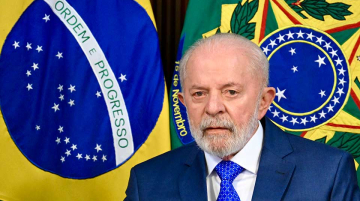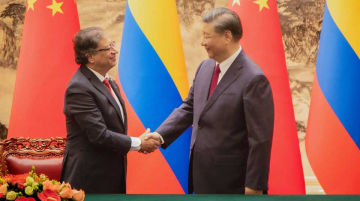
By Thiago P.B. Bessimo
In Brazil, foreign policy appears to be a delicate dance these days, with Luiz Inácio Lula da Silva’s administration striking a careful balance between competing global powers. Lula’s foreign policy advisor, Celso Amorim—often seen as the real engine behind Brazil’s international strategy—recently gave conflicting signals on the Belt and Road Initiative (BRI), China’s sprawling infrastructure and trade project.

Speaking to the influential newspaper O Globo, Amorim initially cast doubt on Brazil’s full alignment with BRI, only to later hint at openness to the idea in a smaller publication. The contradictory statements underscore Brazil’s current balancing act, particularly considering Brasília’s geopolitical ambitions.
As Lula recovers from a recent domestic accident, which sidelined him from the BRICS summit in Russia, Brazil faces complex challenges. While some countries closer to Putin want to turn the BRICS group into a more overtly anti-West alliance, Itamaraty, as Brazil’s Foreign Ministry is called, seeks to maintain the original purpose of the group. BRICS was never about counteracting the West; instead, it created an alternative forum for nations without proper representation in the International Order. Coupled with Brazil’s recent veto of Venezuela’s BRICS accession, this situation highlights a growing discomfort within foreign policy circles in Brazil.
While China has long been Brazil’s largest trading partner, the U.S. and E.U. are constant sources of stress for Brasília. European lawmakers are pushing Brazil to tackle deforestation if it wants to keep its agricultural exports flowing. And with Brazil hosting the G20 this month, any bold step toward China could overshadow its own diplomatic agenda, diminishing Lula’s ability to define Brazilian leadership in this pivotal moment. Notably, in case Donald Trump returns to the White House, Brasília would have to recalibrate its foreign policy messaging. Therefore, it would be prudent to avoid any costly entanglements with China and its Initiative.
While many countries take sides in the West-China divide, Brazil tries to position itself in the middle, keen to fight poverty and foster economic growth while avoiding direct confrontation.
As Amorim’s remarks suggest, Brazil values its bilateral relationship with China without necessarily needing a formal BRI label. The pragmatic question for Brazil: What concrete difference does joining BRI make? Brazilian diplomats have long argued that Brazil can secure Chinese investment independently.
Domestically, joining BRI could make Brazilian policy vulnerable to future shifts in leadership. Right-wing leaders in Brazil might see participation in BRI as an easy target to undo, complicating relations with China. Moreover, the BRI’s opaque structure and association with an embattled Chinese economy dampen the appeal in a media environment sensitive to shifts in Brazil’s investment rating.
Meanwhile, the U.S. maintains a firm presence in Brasília, evidenced by its massive new embassy complex under construction, a long-term investment that symbolizes the historic partnership. The U.S. already exerted subtle influence on Brazil’s military during the last election cycle, reportedly helping to stave off a potential coup by Bolsonaro. The embassy’s presence signals that Washington will keep a close watch on Brazil’s international maneuvers.
In the end, while Brazil’s agribusiness sector stands to benefit from BRI, the country could still secure favorable deals through its own brand of diplomacy. Amorim’s comments, although confusing, are an exercise in autonomy—making it clear that joining BRI is less about ideology and more about timing. As Brazil takes center stage at the G20, Lula’s government is careful not to commit to one side, opting instead for the ever-cordial approach to foreign policy: polite yet independent.
Thiago P.B. Bessimo is the co-founder and Institutional Director of Observa China观中国.







